新概念英语第2册 L28 第28课 教案
(完整word)新概念二L27-28讲义
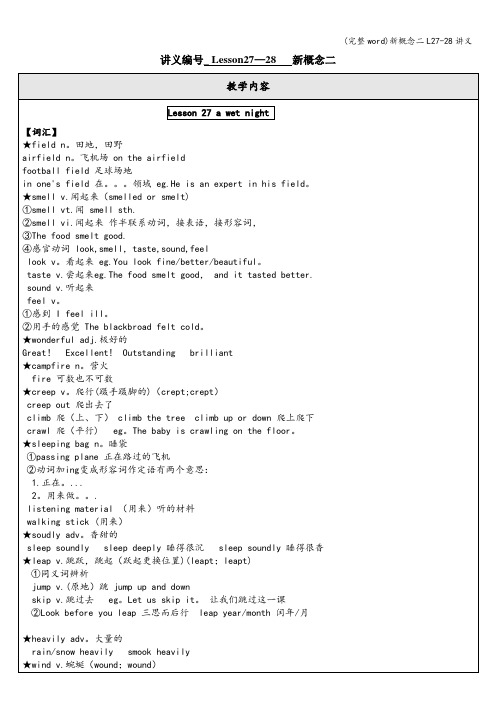
讲义编号_ Lesson27—28
新概念二Lesson28教案
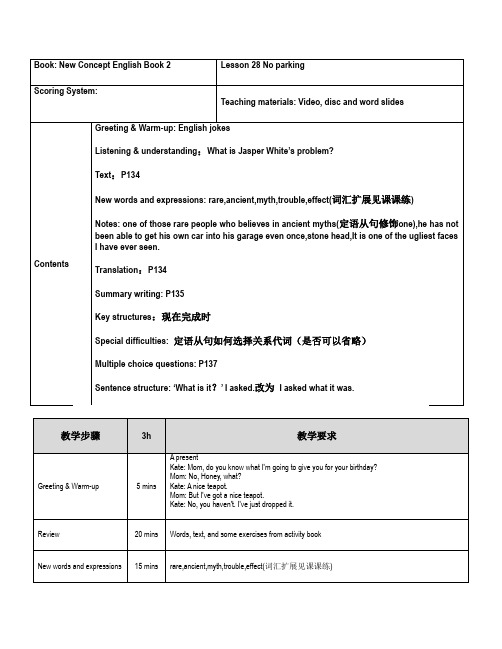
New words and expressions:rare,ancient,myth,trouble,effect(词汇扩展见课课练)
Notes: one of those rare people who believes in ancient myths(定语从句修饰one),he has not been able to get his own car into his garage even once,stone head,It is one of the ugliest faces I have ever seen.
P136-137
Dictation
15mins
Vocabularies and sentence patterns from L27
Homework assignment
5mins
Review words
Review text
Finish the activity book
如果关系词在从句中做宾语, 关系词可以省略, 所以 I 前的which被省略
有两个结构一定用最高级:
of+范围 of all the students
in+地点 He is the tallest in the room.
5.Jasper hopes that she will turn cars and their owners to stone.
Book:New ConceptEnglish Book 2
Lesson28 No parking
Scoring System:
Teaching materials:Video, disc and word slides
新概念第二册Lesson 28 No Parking

Did you find out what is wrong with the book?
Gorgon is the name for the three sisters, not one of them! Correct it on your book!
Match them!
What myth do you know?
Lesson 28 No Parking
• 美杜莎和她的姐姐丝西娜和尤瑞艾莉统称为戈耳工(蛇发女妖)三姐 妹 戈耳工是希腊神话中的蛇发女妖三姐妹,居住在遥远的西方,是 海神福耳库斯的女儿。她们的头上和脖子上布满鳞甲,头发是一条条 蠕动的毒蛇,长着野猪的獠牙,还有一双铁手和金翅膀,任何看到她 们的人都会立即变成石头。宙斯之子珀尔修斯知道这个秘密,因此背 过脸去,用光亮的盾牌作镜子,找出美杜莎,在雅典娜和赫耳墨斯的 帮助下割下了她的头。从美杜莎的躯体里跳出双翼飞马珀伽索斯和巨 人克律萨俄耳,他们都是波塞冬的后代。珀尔修斯躲避美杜莎两个姐 姐的追杀时,在空中遇到狂风的袭击,被吹得左右摇晃,从美杜莎的 头颅上滴下的鲜血落到利比亚沙漠中,成为毒蛇(包括上面所介绍的 毒蜥)。 在蛇发女妖三姐妹中,只有美杜莎是凡身,她的姐姐丝西娜和尤 瑞艾莉都是魔身。据说美杜莎曾经是一位美丽的少女,因吹嘘自己比 雅典娜长得漂亮而被这位智慧女神夺去了她的所有美丽,只留给她一 个丑陋的妖怪之躯。
Tell us in English!
故事中一定要用一句现在完成时!
effect
结果 效果 n.
What is its verb? affect
Butterfly effect
• 美国气象学家爱德华· 罗伦兹(Edward N.Lorentz)1963年在一 篇提交纽约科学院的论文中分析了这个效应。“一个气象学家 提及,如果这个理论被证明正确,一只海鸥扇动翅膀足以永远 改变天气变化。”在以后的演讲和论文中他用了更加有诗意的 蝴蝶。对于这个效应最常见的阐述是:“一只南美洲亚马逊河 流域热带雨林中的蝴蝶,偶尔扇动几下翅膀,可以在两周以后 引起美国德克萨斯州的一场龙卷风。”其原因就是蝴蝶扇动翅 膀的运动,导致其身边的空气系统发生变化,并产生微弱的气 流,而微弱的气流的产生又会引起四周空气或其他系统产生相 应的变化,由此引起一个连锁反应,最终导致其他系统的极大 变化。他称之为混沌学。当然,“蝴蝶效应”主要还是关于混 沌学的一个比喻。也是蝴蝶效应的真实反应。不起眼的一个小 动作却能引起一连串的巨大反应。
2024年新概念英语NCE2_Lesson28(共19页)课件

Rare & scarce
拓展: scarce 少有的(在某一地方或某一时间段少有) 对比rare和scarce: scarce带有短缺的、不能满足需求的意思。 rare主要指珍贵的、优秀的,形容空气时还有稀薄的意
思。
e.g. With the fall of the Roman empire, historical evidence becomes scarce.
New Concept English 2
Lesson 28 No Parking
Listen & Answer
1. What is Jasper White’s problem? 2. What does Jasper White believe in? 3. Where do car owners always park
• believe in是信任的意思,针对某人的总体; believe in doing sth. 可以表示认为做某事有用,肯定某事物的价 值 He believes in God. 他相信上帝的存在
e.g. I belive in you, but I don’t believe you this time.
• 随着罗马帝国的沦落,历史性的证据变得稀少。 Events of this size are rare, but not so rare
that they can be ignored. • 象这种规模的事例是很少见的,但是也不会稀少到可
以被忽略。
believe
• believe是相信的意思,对事不对人。believe sb.或 sth, 强调的是相信事情的真实性,或者强调某人说的话 的真实性,总的就是客观地对事情而言;还可以表示有 宗教信仰 (He thinks that everyone who believes will go to heaven )
新概念英语第二册第28课-No parking

新概念英语第二册第28课:No parkingLesson 28 No parking禁止停车First listen and then answer the question.听录音,然后回答以下问题。
What is Jasper White's problem?Jasper White is one of those rare people who believes in ancient myths.贾斯珀.怀特是少有的相信古代神话的人之一he has just bought a new house in the city, but ever since he moved in, he has had trouble with cars and their owners.他刚在城里买下一所新房子,但自从搬进去后,就和汽车及车主们发生了磨擦When he returns home at night, he always finds that someone has parked a car outside his gate.当他夜里回到家时,总是发现有人把车停在他家大门外Because of this, he has not been able to get his own car into his garage even once.为此,他甚至一次也没能把自己的车开进车库Jasper has put up 'No Parking' signs outside his gate, but these have not had any effect.贾斯珀曾把几块“禁止停车”的牌子挂在大门外边,但没有任何效果Now he has put an ugly stone head over the gate. It is one of theugliest faces I have ever seen.现在他把一个丑陋的石雕头像放在了大门上边,这是我见过的最丑陋的头像之一I asked him what it was and he told me that it was Medusa, the Gorgon.我问他那是什么?他告诉我那是蛇发女怪美杜莎jasper hopes that she will turn cars and their owners to stone. But none of them has been turned to stone yet!贾斯珀希望她把汽车和车主们都变成石头。
新概念英语第二册课件Lesson28
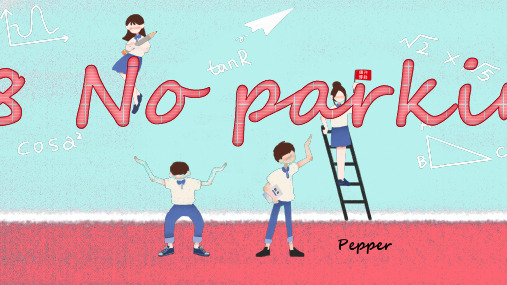
He is talking to a man that is wearing a hat.
注意:以下几种情况只能使用__t_h_a_t__充当引导词
a. 先行词为最高级时 例:She is the best player that I have ever seen. b. 先行词为序数词时 例:She is the first woman that wins the cg. a先m行es词. 为人与物时
effect n. the way in which an event, action, or person changes someone or something
have an effect on sb. or sth.
这本书对我有很大(great)影响。
This book has a great effect on me.
吃垃圾食品对人们有坏处。
Eating junk food has a bad effect on people.
02 Game Time
03 Grammar
I can see a big baby.
I can see a baby with a pair of gI claasnsesse.e a baby whoPride hurts, modesty benefits
满招损,谦受益.
美杜莎是希腊神话中的一个女妖,戈耳工 三女妖之一,一般形象为有双翼的蛇发女 人。她的父亲是福耳库斯,母亲则为海妖 怪刻托。她的头发都是蛇。根据诗人奥维 德的《变形记》(Metamorphoses 4.770)所述,她原是一位美丽的少女, 因为与海神波塞冬私自约会(也有一些版 本称因美杜莎自恃长得美丽,竟然不自量 力地和智慧女神比起美来,而被雅典娜诅 咒),雅典娜一怒之下将美杜莎的头发变 成毒蛇,而且给她施以诅咒,任何直望美 杜莎双眼的人都会变成石像,因此成了面 目丑陋的怪物。
新概念英语第2册课件Lesson28(共16页)
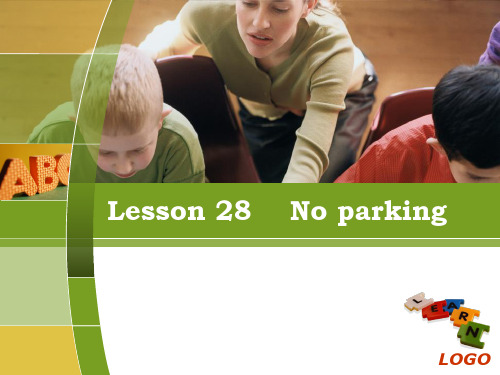
Return, garage
❖effect 效果
4. What did Jasper do to solve the problem? Did it have any effect?
❖ 贾斯泊曾把“禁止停车”的牌子挂在门外, 但没有任何效果。
1 Gorgon Medusa
Gorgon n.
三位蛇发女妖之一
她变成了一头面目可憎的 怪物,任何有生命的东西 只要看到她就立刻变成石 头。
New words
❖ rare
罕见的
❖ ancient
古代的,古老的
❖ myth
神话故事
❖ trouble
麻烦
❖ effect ❖ garage
结果,效果 车库
Jasper, believe
❖have trouble with sth 烦恼某事
2. What did Jasper buy in the city and what happened later?
❖He has just bought a new house in the city, but ever since he moved in, he has had trouble with cars and their owners.
❖Jasper has put up 'No Parking' signs outside his gate, but these have not had any effect.
Sign, effect
❖ugly 丑陋的 5. What did Jasper put over the gate?
新概念英语第二册Lesson 28No parking+学案
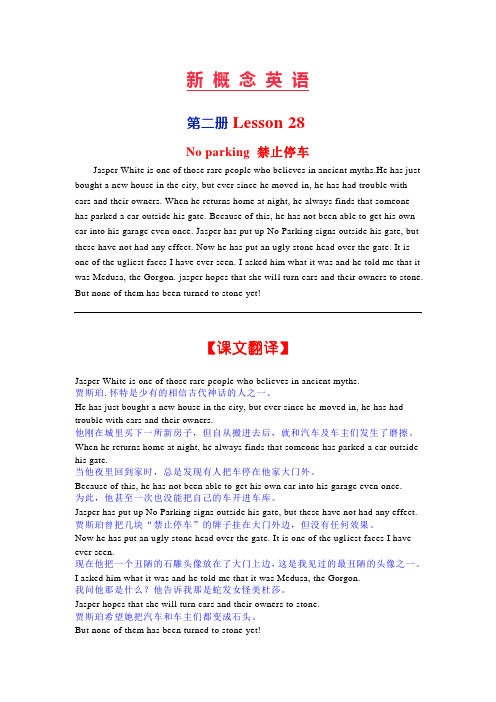
新概念英语第二册Lesson 28No parking 禁止停车Jasper White is one of those rare people who believes in ancient myths.He has just bought a new house in the city, but ever since he moved in, he has had trouble with cars and their owners. When he returns home at night, he always finds that someone has parked a car outside his gate. Because of this, he has not been able to get his own car into his garage even once. Jasper has put up No Parking signs outside his gate, but these have not had any effect. Now he has put an ugly stone head over the gate. It is one of the ugliest faces I have ever seen. I asked him what it was and he told me that it was Medusa, the Gorgon. jasper hopes that she will turn cars and their owners to stone. But none of them has been turned to stone yet!【课文翻译】Jasper White is one of those rare people who believes in ancient myths.贾斯珀.怀特是少有的相信古代神话的人之一。
新概念第二册lesson28详解

Lesson 28 No Parking词汇学习:★rare adj.罕见的, 珍贵的,It is rare to find such a genius nowadays. 这样的天才现在很少见。
A collector of rare insects will show us some of his latest discoveries. 一位稀有昆虫采集家将给我们看一些他的最新发现。
Parliament has passed an Act forbidding the killing of rare animals. 国会通过了一项法令,禁止捕杀珍稀动物。
rarely adv.很少, 难得I rarely have short drinks. 我很少喝烈性酒。
The country's car industry is so strongly protected that foreign cars are rarely seen there.该国对汽车工业严加保护,外国汽车甚为罕见。
The leader rarely shows herself in public. 这位领导她很少在公众场合露面。
★believe v.相信,认为;(in)信任I don't believe a single word he says. 他的话我一句也不信。
We believe Mr. Smith to be innocent. 我们认为史密斯先生是无辜的。
He did not believe in Howard's honesty. 他不相信霍华德为人真诚。
belief n.信念;信任believable a.可以相信的unbelievable a.不可相信的believer n. 信徒★ancient adj.古老的, 古代的反contemporary a.当代的;同时代的n.同代人,当代人modern a.现代的, 时髦的n.现代人, 时尚人士This is an ancient parable. 这是一个古老的寓言。
新概念英语第二册Lesson28课件
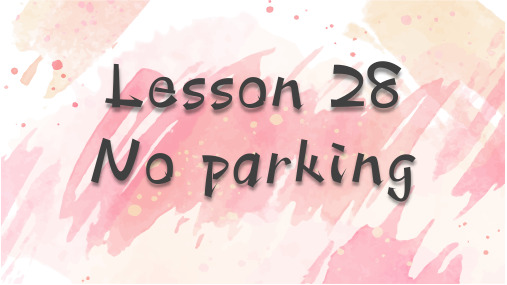
/ˈtrʌb(ə)l/ n. 麻烦 The task is big trouble for all of us. ➢ have trouble with 对……有麻烦;有问题 Foreigners often have trouble with Chinese. ➢ have trouble (in) doing sth. 做某事遇到麻烦 They had trouble (in) working out the difficult math problems. ➢ be in trouble 处于困难中 Their marriage is in trouble now. ➢ get into trouble 遇到麻烦,陷入麻烦 You may get into trouble if you play with fire.
定语从句
3.It is one of the ugliest faces I have ever seen. 这是我见过的最丑陋的头像之一。
关系代词that被省略, 因为先行词在从句中作宾语。
4.Jasper hopes that she will turn cars and their owners to stone. 贾斯伯希望她把汽车和车主们都变成石头。
2.Because of this, he has not been able to get his own car into his garage even once. 因此,他甚至一次也没能把自己的车开进车库。
(1) because of +代词/名词,表示“因此” (2) be able to 和 can 的区别∶ a.现在时和过去时中∶can/could与be able to可互换 b.将来时和完成时中∶只能使用 be able to e.g. I’ll be able to pass my driving test after I've had lessons.
(完整word版)新概念二L27-28讲义

②never trouble troubles until troubles trouble you 永远不要自寻烦恼
Let sleeping dog lie。 不要自找麻烦
ask for trouble 自找麻烦
I'm sorry to put you in trouble.我很抱歉给你带来麻烦(口语)
(完整 word 版)新概念二 L27-28 讲义
Lesson 28 No Parking
【词汇】
★rare adj。罕见(在世界上少有)
①rare animal 稀有动物 rare ห้องสมุดไป่ตู้ird 珍稀鸟类 rare illness 疑难杂症
well done 全熟
medium 半生半熟 rare 几乎是生的
I found my lost watch right in the garden
【课文讲解】 te in the afternoon,the boys put up their tent in the middle of a field.
★late in the afternoon 傍晚 类似表达:late at night深夜 early in the morning一大早 2.As soon as this was done,they cooked a meal… ★as soon as 一...就.。./当..。 ★cook a meal for sb (给某人)做饭 表示做饭的用语:roast烤肉/bake(用烤炉)烘/ grill直接用火烤/fry炒/deep fry油炸/boil煮/stew炖 /steam蒸 3。They were all hungry and the food smelled good.他们全都饿了,饭菜散发出阵阵香味。 ★smell作系动词,感官动词+系动词,类似结构在英文中还有 soud interesting 听起来有趣/look charming看起来迷人/feel soft摸起来柔软 4。The boy felt tired so they put out the fire and crept into their tent。 ★put out 人为地熄灭 eg.I put out the fire. be out 火自动地熄灭 eg.The fire is out。 联想记忆 put away 收拾 eg。Put the toys away。把玩具收拾好.
新概念-2-Lesson28-No-parking
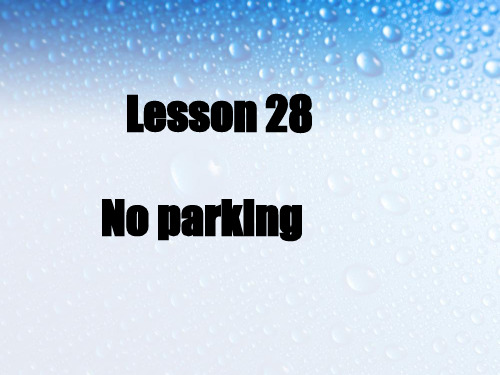
比较下列两语的不同涵义: I believe him. (=I believe what he says) 我相信他(的话)。 I believe in him. (=I trust him ) 我信任他
He has just bought a new house in the city, but ever since he moved in , he has had trouble with cars and their owners.
rare visitors
rare treasures
rarely <adv.>
几乎不
• 我几乎没有时间看电影。
• I rarely have time to watch a movie.
trouble <n.>
have trouble with sth.
have trouble (in) doing sth.
巩固练习
• 你昨天错过的会议非常重要. • The meeting that you have missed yesterday was very important. • 正在做演讲的女孩是我们班的班长. • The girl who is making a speech right now is our monitor. • 这正是我所感兴趣的话题. • That's just the topic that I'm very interested in. • 两个女儿都是教师的那个老奶奶是我们的邻居. • The old lady whose two daughters are both teachers is our neighbor.
那些人都很高效。 Those people are highly effective. 该法令已失效。 This law is no longer effective.
新概念第二册教学课件 第28课

New words and expressions•rare•An event or situation that is rare does not occur very often.• e.g He gives a rare gift to me.•ancient•Ancient means belonging to the distant past, especially to the period in history before the end of the Roman Empire.•Ancient means very old, or having existed for a long time.• e.g I like ancient story very much.•myth• A myth is a well-known story which was made up in the past to explain natural events or to justify religious beliefs or social customs.• e.g It's only a myth.•trouble•You can refer to problems or difficulties as trouble.• e.g You have caused us a lot of trouble.•effect•The effect of one thing on another is the change that the first thing causes in the second thing.• e.g Parents worry about the effect of music on their children.•Gorgon•Any of three winged monstrous sisters, Stheno, Euryale, and Medusa, who had live snakes for hair, huge teeth, and brazen claws.•Medusa•She is a mortal woman who was transformed by Athena into one of the three Gorgons.Her appearance was so hideous that those who looked directly at her were turned to stone.Key structures ---What has happened?•Study these sentences carefully. Pay close attention to the words in italics:•I have just received a letter from my brother, Tim.•I have not seen Tim since last January.•I have not seen Tim for three years.•Tim has been abroad for three years.•Up till now he has won five prizes.•Up till now I have been to New York three times.•I have been to New York three times so far.•Have you been to New York?•Have you seen this film?•Have you read this book?The Present Perfect Tense•Basic structure:Subject +have/has+ past participle+ Object•①Positive sentence:•Subject +has/have+(V-ed)+past participle+ Object•②Negative sentence:•Subject+haven't/hasn't+past participle+ Object•③General question:•Have/Has+ Subject +past participle+ Object ?Key for Key Structures•A•has just bought (1.2)•has had (1.3)•has parked (1.4)•has not been able (1.5)•has put up (1.6)•have not had (1.7)•has put (1.8)•have ever seen (1.9)•has been turned (1.10)Key for Special Difficulties•1. which/ that•2. who / that•3. whose•4. which•5. that•6. that/ which•7. who / thatKey for Multiple Choice Questions • 1. c• 2. d• 3. b• 4. b• 5. c• 6. d•7. b•8. d•9. c•10.d•11.b•12.a。
新概念英语第二册课件ppt第28课Lesson28

v. 麻烦,找麻烦
Why trouble yourself? Don’t trouble the trouble
until the trouble troubles you!
effect n. 结果, 效果 have an effect 有效果 have no effect 没有效果 have effect on 对...有效果 那个建议对我没效。
The advice has no effect on me. effective adj. 高效的,有效果的
Medusa n. 美杜莎(古希腊 神话中3位蛇发女怪这一)
Gorgon (古希腊神话中的)3位蛇发 女怪这一(凡见其貌者都会变成石头)
另两位是: 丝西娜和尤瑞艾莉
New words
rare:几乎 生的
well done :
全熟的
medium :
半生半熟的
bare care (Who cares?) dare (how dare you?) fare (bus fare) ware (glass ware)
ancient adj. 古代的, 古老的 古埃及
have trouble doing 做...有麻烦 have trouble with sb. 和某人相
处有麻烦
I have no trouble with my roommates/family/friends/class mates.
be able to 的主语一般都是人, 表示有能力去做
Everyday English
1. I won’t buy your story! 我才不信你的鬼话呢! 2. My mouth is watering. 我在流口水了。 3. Don’t even think about it! 想都别想!
新概念第二册第二十八课学习教案

6. --- These farmers have been to the United States.
---- Really? When ____Bthere?
A will they go C. do they go
B. did they go D. have they gone
第20页/共32页
第二十一页,共32页。
7. It _A__ ten years since he left the army.
A. is B. has C. will
D.
was
8. His uncle __C__ for more than 9 years. A. has come here
B. has started to work C. has lived there
过去时常用的非持续性动词(dòngcí)有 come, go, leave, start, die, finish, become, get married等。
第15页/共32页
第十六页,共32页。
用于现在(xiànzài)完成时的句型 1)It is the first / second time…. that…结构中 的从句(cónɡ jù)部分,用现在完成时。 It is the first time that I have visited the city. It was the third time that the boy had been late.
第3页/共32页
第四页,共32页。
Myth—Medusa (神话故事
(shén huà美ɡ杜ù莎曾s是h一ì)位)美丽的 少
2 女,一头乌黑的头发使她容光
照人。
- 1、下载文档前请自行甄别文档内容的完整性,平台不提供额外的编辑、内容补充、找答案等附加服务。
- 2、"仅部分预览"的文档,不可在线预览部分如存在完整性等问题,可反馈申请退款(可完整预览的文档不适用该条件!)。
- 3、如文档侵犯您的权益,请联系客服反馈,我们会尽快为您处理(人工客服工作时间:9:00-18:30)。
LESSON 18
Words
1.pub[pʌb](BrE)酒吧;酒馆(在英国英语的口语中较常见)
e.g. 咱们去酒吧喝杯酒吧。
Let’s go to the pub for a drink. bar n. 酒吧
inn n.(AmE)(通常指乡村的,常可夜宿的)小酒店;小旅馆。
ndlord n.房东,地主;店主;老板。
、
3.bill[bil] n.& v.
n. 1)账单
e.g. pay the bill付账单
她总是按时支付账单。
She always pays her bills on time.
买单!Bill, please!
2)(AmE) 纸币
e.g. 一张十美元的钞票a ten-dollar bill
v.
1)vt. ~sb.(for sth.)开账单,发账单
e.g. 请将所购的书开列账单。
Please bill me for the books.
2) vt.~sb./sth. as sth.把(某人或事物)宣传为…
e.g. 他被宣传为新的明星。
He was billed as the new star.
Text
1.After
过去完成时态常同表示时间状语的从属连词after 一同使用,
如:e.g. 他把信全写完后干了些家务活。
After he’d written all her letters, she did some housework.
假如从句中先于主句谓语动词动作发生的那个动词动作很短暂,常可用一般过去时来代替过去完成时态,如:
e.g. 他把猫放出去后,它就跑开钻进了灌木丛。
After she put the cat out, it ran off into the bushes.
(但是,当两个分句为同一主语时,更早发生的那个动作通常用过去完成时态来表示。
如:
e.g. 他送走她后就锁上门,睡觉去了。
After he had seen her off, he locked the door and went to bed. )
2.look for 表示“寻找”的动作;
find 表示“寻找”的结果find sb. sth.=find sth. for sb.
find out 查明,弄清(情况) 强调经过研究努力之后发现、找出、搜出结果。
e.g. 我还没有发现有关他的什么情况。
I haven’t found anything out about him yet.
3.leave [li:v] v.&n.
v. (left, left)
1)vi.& vt. 离开(某人或某处)
e.g. 离开某地to leave some place
离开前往某地to leave for some place
E.g.飞机于12:00起飞前往北京。
The plane leaves for Beijing at 12:00.
2)使保留,让…处于(某种状态、某地等)(后+adj./v-ing)
e.g. 请把门开着吧。
Leave the door open, please.
别让她在外边雨里等着。
Don’t leave her waiting in the rain.
3) 忘了带;丢下:
e.g. 我把包丢在公共汽车上了。
I’ve left my bag on the bus.
n. [u]
1)假期;休假:
e.g. 休假一个月to take a month’ leave
on leave休假中
4.beside [bi'said] 1) prep. 在旁边(或附近):
e.g. 整个晚上他都坐在她的身边。
He sat beside her all night. besides[bi'saidz] prep.&adv.除…之外(还):
e.g.除了我们以外,晚会上还有许多(其他)人。
There were a lot of people at the party besides us.
adv. 而且;再说:
e.g. 我并不真的想去。
而且现在太晚了。
I don’t really want to go. Besides, it’s too late now.
besides / apart from / except
besides 作介词表示除…之外(还有)
e.g.除了我们以外,晚会上还有许多(其他)人。
There were a lot of people at the party besides us.
指仅有某事物不包括在内用except:
e.g. 除足球外我喜欢所有的运动。
I like all sports except football.
上述两种含义均可用apart from:
e.g. 除足球外你还喜欢哪些运动?
What other sports do you like apart from football?
除足球外我喜欢所有的运动。
I like all sports apart from football.
except&except for
但是except不用于句首,except for则可以:
5.take/bring sth. with sb. 随身携带某物
Key structure
have用法
1.have作为助动词构成各种完成时(包括过去、现在、将来)和完成进行时:
2.have与to一起构成情态动词have to,表示“不得不”、“必须”, 它比must更含有“客观条件使得必须如此做”的意思,可用于各种时态。
have got =have
Have I got to? 和Do I have to?这两种疑问形式均可用。
3.have用于“情态动词+have+过去分词”的结构,有推测、假设之意。
4. have表示“具有”、“拥有”讲时(相当于own, possess),它和have got通常可以互换。
e.g. 他有一栋房子。
He owns a house. / He has a house. / He has got a house. / He possesses a house.
5.患病;得病;染病:e.g. 我头疼。
I’ve got a headache.
6.have作实意动词时,还可以表示eat, drink, enjoy, take,experience,hold等意思
Special difficulties
1.give sb. back sth. /give sth. back (to sb.)还;归还;送回;
2.give in (to sb./sth.)屈服;认输;投降:give sth. in (to sb.)呈上;交上:
3.give up 投降;认输;放弃:
4.give oneself/sb. up (to sb.)自首;投案;投降
拓展
1.give off sth.发出,放出(气味、热、光等):
2. give out 用完;耗尽;停止运行;停止运转;分发;散发;公布;宣布;播放
Multiple choice question
KEY: 1. b 2.d 3. b a. paidfor(付钱) ;c. kept(保持);d. bought(买)都同had 意思不同,所以选b.是对的。
3.d 5. b
6. c只有c. own(拥有)同前一句中的have got 意思相同。
a. get (得到,获得);
b. buy(买);d. owe(欠,负债);这3个选择都与have got 意思不符合。
7. d 8. c
9. a只有a. put 才能使这个句子同前一句I had left it on the chair 意思相吻合并符合逻辑。
而其他3个选择b.
let(让),c. allowed(允许),d. permitted(许可,允许)都不符合题目意思。
10. c 11. c 12. b。
